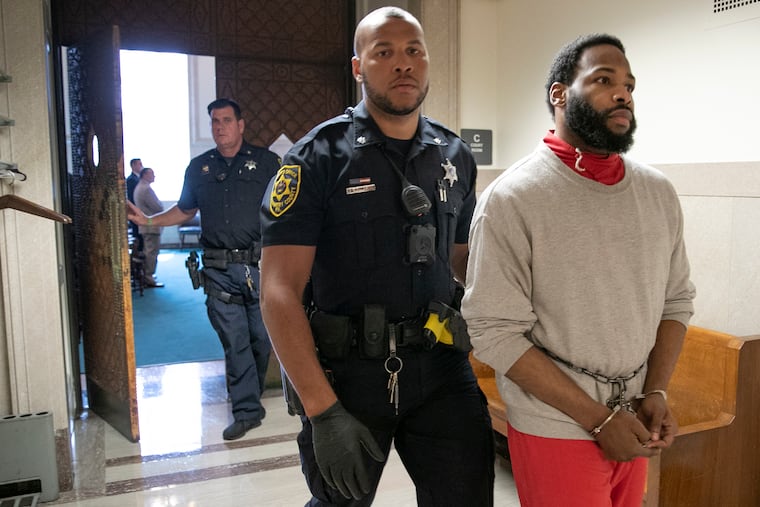Ardmore model’s killer gets life in prison for 2018 attack
Jonathan Harris expressed his "deepest condolences" to Christina Carlin Kraft's family on Tuesday.

Alex Ciccotelli stared down Jonathan Harris in a Montgomery County courtroom Tuesday and unleashed a torrent of emotion, his words powered by nearly a year’s worth of grief.
“You killed a kind, loving, generous, amazing person who is sorely missed by everyone every day,” Ciccotelli said, referring to his fiancee, Christina Carlin-Kraft, the Main Line model Harris confessed to strangling in her Ardmore condominium last summer.
A jury found Harris, 31, guilty of first-degree murder in May. On Tuesday, Judge William R. Carpenter sentenced Harris to life in prison and an additional 22½ to 45 years of consecutive time on other charges, including kidnapping and strangulation.
Carpenter said Harris deserved to spend the rest of his life in prison, and said he planned to send that message to future governors and parole boards.
Before the judge handed down his sentence, Ciccotelli gave emotional testimony in which he described the impact of Harris’ crime.
“You murdered a 115-pound defenseless female,” said Ciccotelli, 43. “You destroyed the lives of so many people and inflicted needless pain on our family and your family, and for what?”
Harris, speaking to Carlin-Kraft’s family for the first time since his arrest, took the stand to express his “deepest condolences,” saying he was high on a variety of drugs when he killed her.
“I’m not looking for sympathy or making a plea for my life,” Harris said. “I’m standing here, taking responsibility for the things I’ve done, and I’m willing to accept the punishment, even if it’s death.
“I cannot bring this person back, I cannot change the way you view me,” he added. “But this was never my intention.”
Assistant District Attorney Brianna Ringwood, the lead prosecutor in the case, said Harris’ contrite words contrasted with his actions on the night of Carlin-Kraft’s death.
Carlin-Kraft, 36, was found dead Aug. 22 inside the apartment she shared with Ciccotelli on Sibley Avenue in Ardmore. Ciccotelli contacted police, worried about her safety after he did not hear from her for several days.
After nearly a weeklong manhunt, Harris was apprehended by police in Pittsburgh. He told investigators he met Carlin-Kraft in Center City and accompanied her to her condo, where he said the two had consensual sex, drank wine, and used cocaine.
Later, he said, the two got into an argument after Carlin-Kraft refused to pay for the drugs, and he attacked her, beating her and causing catastrophic injuries. To stop her from screaming, Harris said, he strangled her with a pair of sweatpants.
Investigators didn’t find any drugs at the apartment, and Carlin-Kraft had no illegal substances in her system at the time of her death, according to the autopsy report.
Ciccotelli, speaking Tuesday, further disputed Harris’ narrative. He said that during his 14-year relationship with Carlin-Kraft, she had never used drugs. He accused Harris of “slandering” her, and urged him to tell the truth about their encounter.
“What we know and what we truly believe is that when she told him to leave, he refused to go, he became irate, he knocked her out, and he raped her,” Ciccotelli told reporters outside the courtroom. “And when she came to, he strangled her to silence her forever. That’s what happened.”
Noting that Harris had finished serving a robbery sentence in Western Pennsylvania less than a month before he encountered Carlin-Kraft, Ciccotelli said he planned to push for prison reform.
“As a society, we’re setting ourselves up for failure by letting scenarios like this transpire,” he said. “This man should never have been let out of jail unsupervised.”